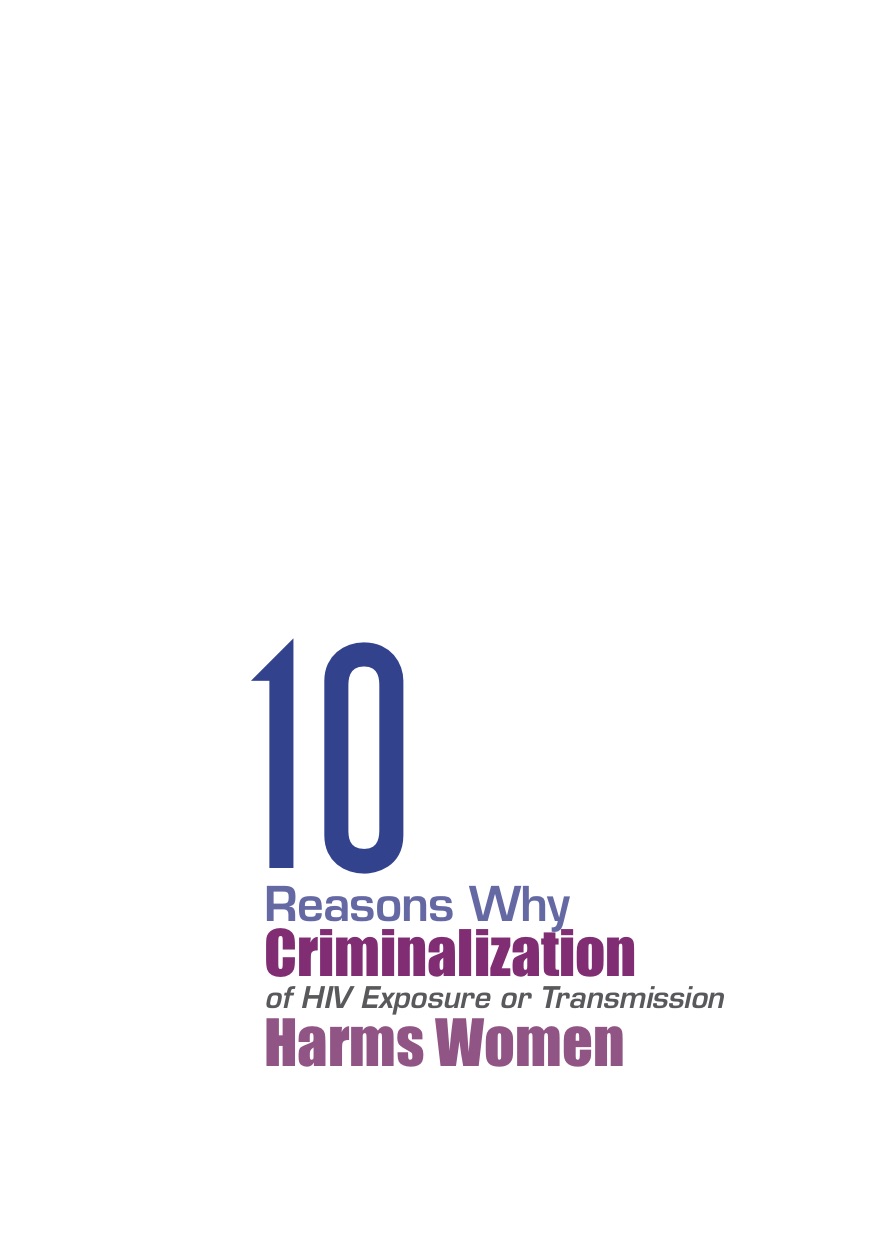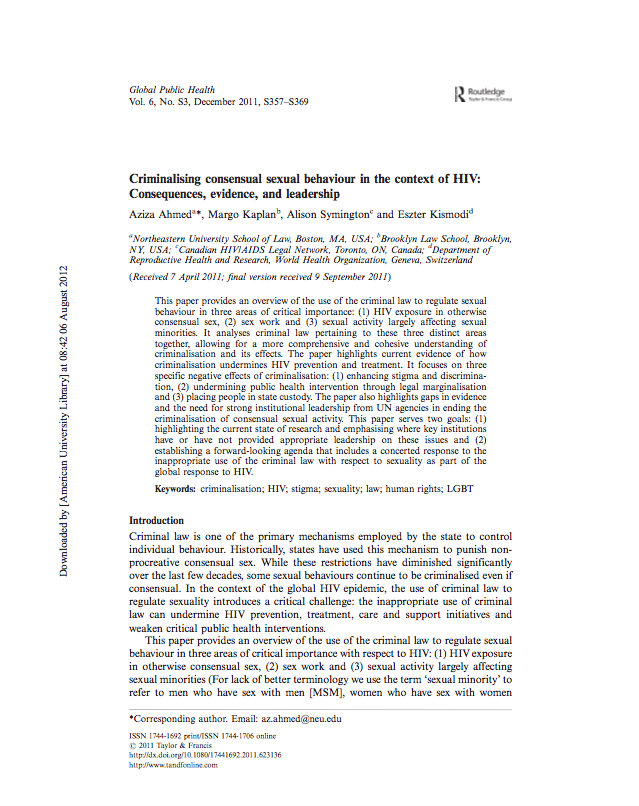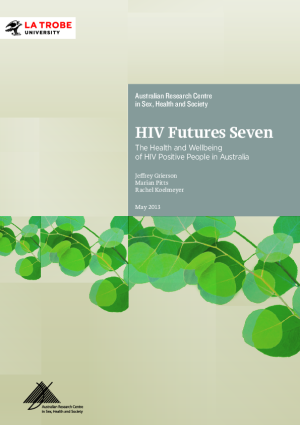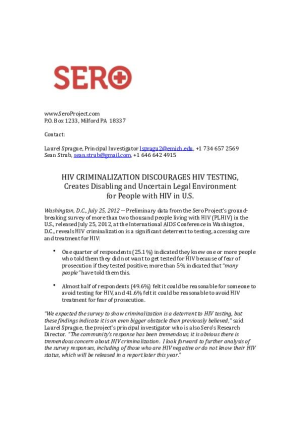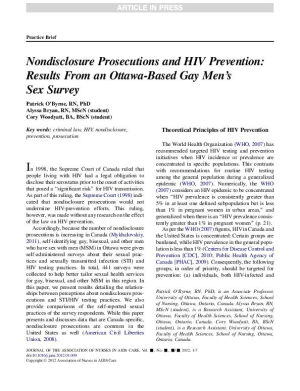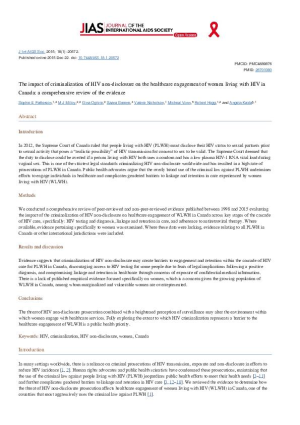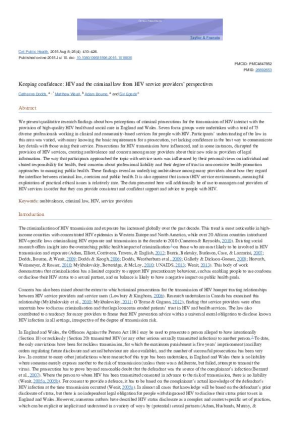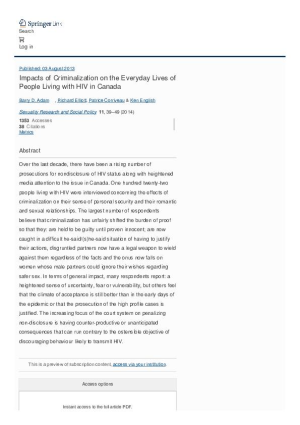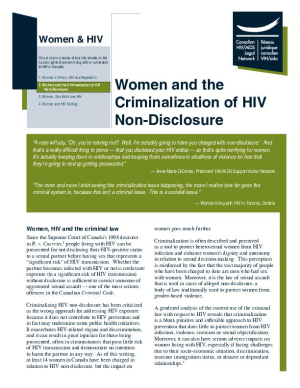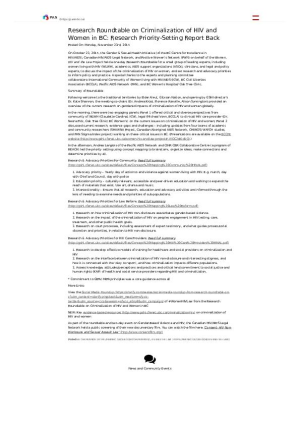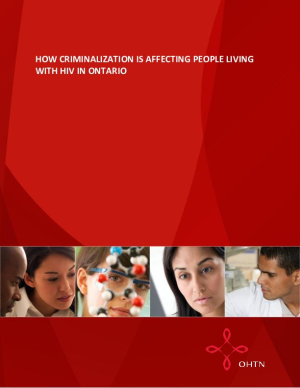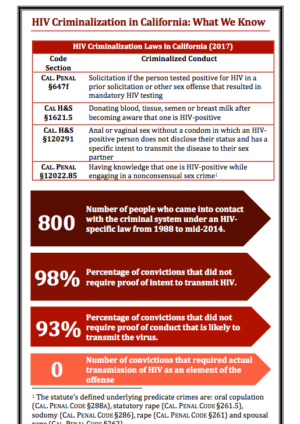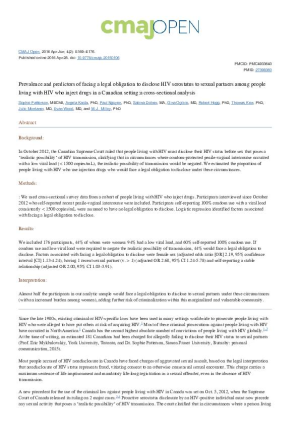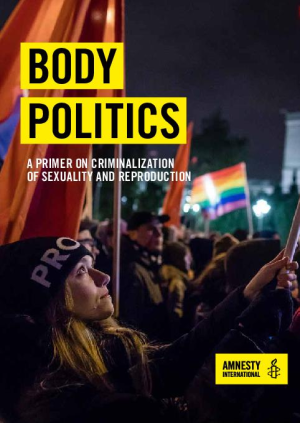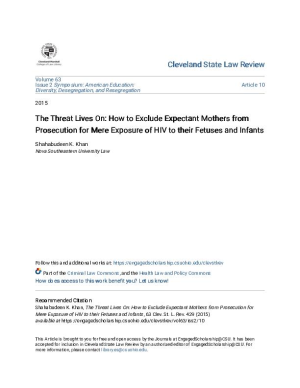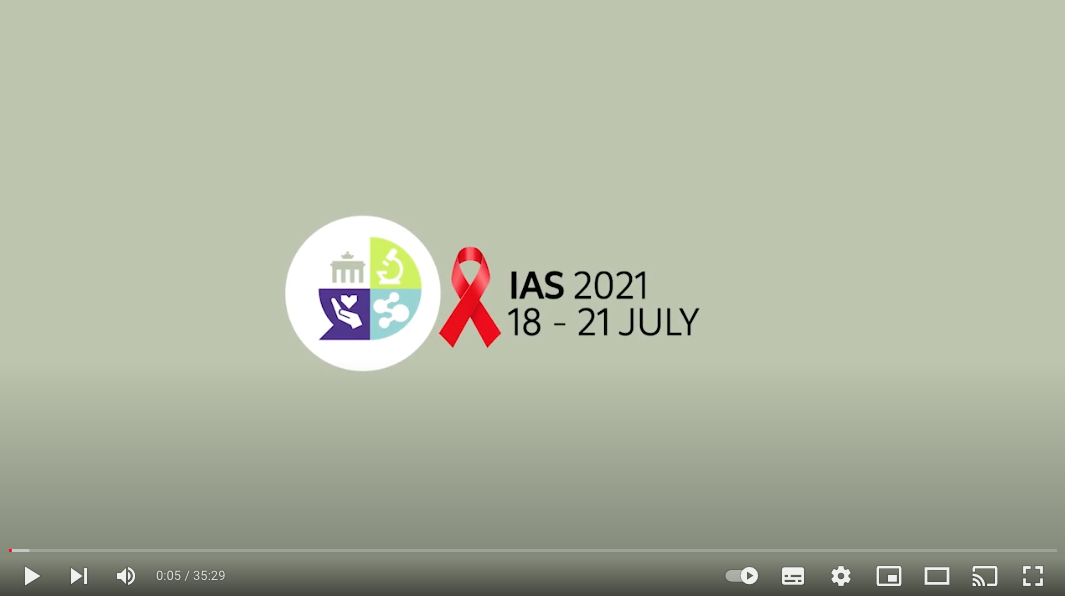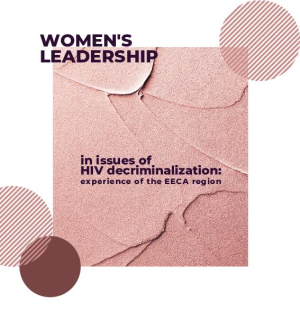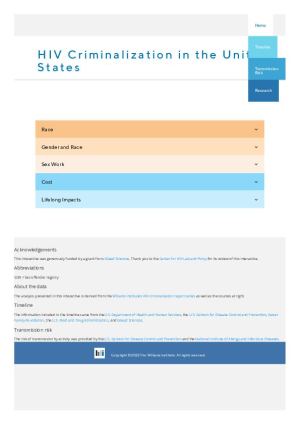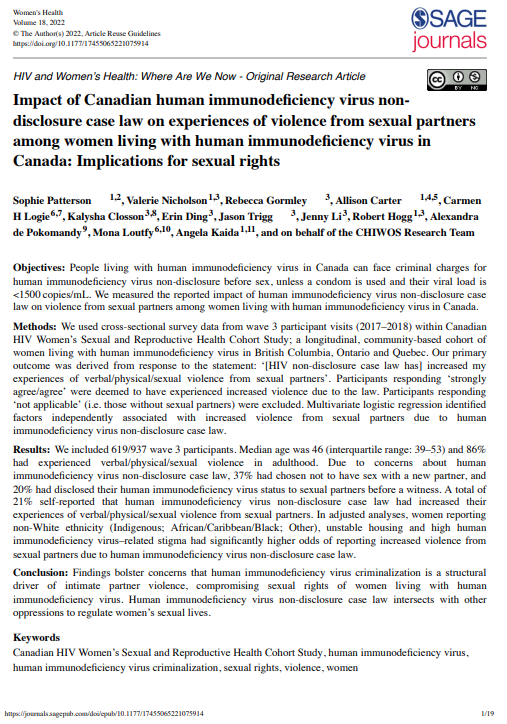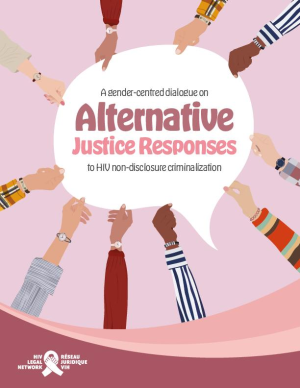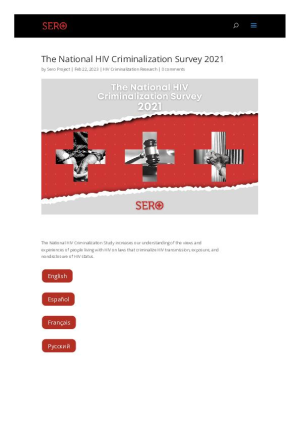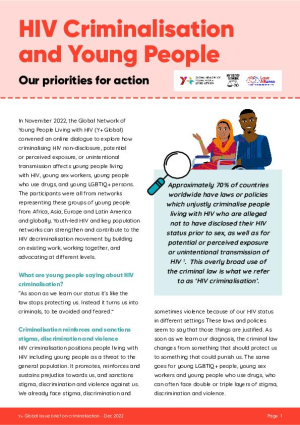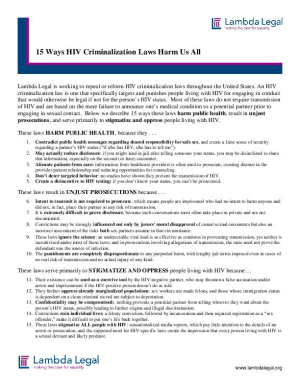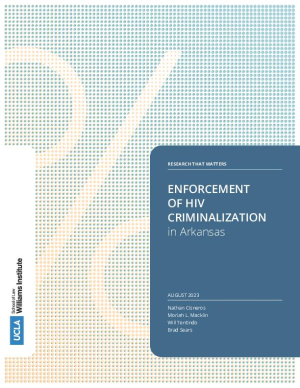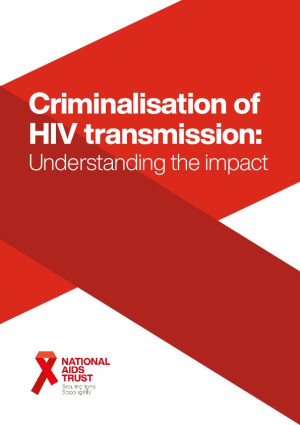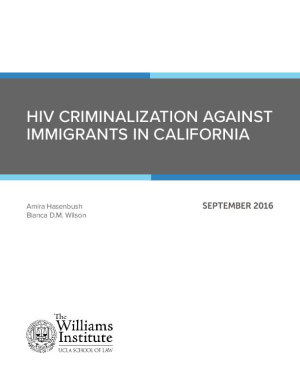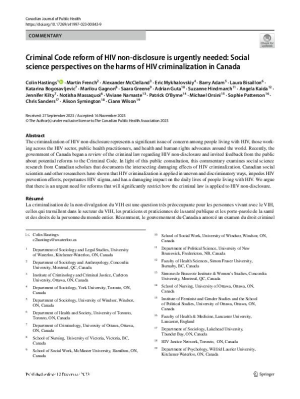Argues that applying criminal law to HIV exposure or transmission does nothing to address the epidemic of gender-based violence or the deep economic, social, and political inequalities that are at the root of women’s and girls’ disproportionate vulnerability to HIV.
Introduction to HIV criminalisation
How criminalisation harms individuals and communities
Criminalizing consensual sexual behaviour in the context of HIV: Consequences, evidence, and leadership
Provides an overview of the use of the criminal law to regulate sexual behaviour in three areas, including HIV exposure during consensual sex. The paper highlights negative effects of HIV criminalisation and argues that strong institutional leadership from UN agencies is required.
Oslo Declaration on HIV Criminalisation
Outlines the importance of a cohesive, evidence-informed approach to use of criminal law relating to HIV non-disclosure, exposure and transmission. Urges Ministries of Health and Justice, public health officials, policymakers and criminal justice system actors to ensure a proportionate response to HIV transmission risk.
HIV Futures Seven: The Health and Wellbeing of HIV Positive People in Australia
Survey of people living with HIV found 30% were concerned about disclosing their sexual practices to service provider (and 13% were uncertain) ‘because of the current legal situation’.
The Sero Project: National Criminalization Survey Preliminary Results
Survey of more than 700 PLHIV found that almost half felt it was somewhat reasonable or very reasonable to avoid testing because of fear of prosecution.
Nondisclosure prosecutions and HIV prevention: Results from an Ottawa-based gay men’s sex survey
Details the relationships between nondisclosure prosecutions and STI/HIV testing practices. Only a minority of survey participants reported that HIV criminal prosecutions affected their willingness to get tested for HIV, or made them afraid to speak with nurses and physicians about their sexual practices. However, that group may also be at higher risk of HIV infection, reporting higher rates of unprotected penetrative anal intercourse and internal ejaculation with (on average) a higher number of different sexual partners within the previous two months. This same group also reported less STI/HIV testing and a preference for anonymous HIV testing.
The impact of criminalization of HIV non-disclosure on the healthcare engagement of women living with HIV in Canada: A comprehensive review of the evidence
Concludes that HIV-related criminal laws either fail to influence or increase STI testing avoidance, unprotected anonymous sexual contacts, and avoidance of health care because respondents do not feel safe speaking with health professionals. Suggests HIV-related criminal laws compromise public health and clinicians’ abilities to establish therapeutic relationships and to undertake HIV prevention and treatment work.
Keeping Confidence: HIV and the criminal law from service provider perspectives
Based on discussions with 75 service providers, this study found that criminalisation has influenced, and sometimes disrupted provision of HIV services, creating ambivalence and concern among many providers about their new role as providers of legal information. Service providers’ approach were influenced by their personal views on shared responsibility for health, concerns about professional liability and their degree of trust in non-coercive approaches to managing public health.
Impacts of criminalization on the everyday lives of people living with HIV in Canada
Based on interviews with people living with HIV, participants reported that HIV prosecutions had created a heightened sense of fear, vulnerability and stigma – “consequences that can run contrary to the ostensible objective of discouraging behaviour likely to transmit HIV.”
Women and the Criminalization of HIV Non-Disclosure
Outlines the history of HIV prosecutions against women in Canada and why criminalization is bad for women. Includes recommendations for reform.
Results from the Roundtable on Criminalization of HIV and women in BC Priority Setting Day
Outlines the impact of the criminalization of HIV on women, and sets research and advocacy priorities to inform policy and practice.
How Criminalization is Affecting People Living with HIV in Ontario
Examines how people living with HIV perceive the law and the legal obligation to disclose serostatus to prospective sexual partners. Notes perceptions of a changing public climate resulting from the increasing prominence of criminal discourses applied to HIV.
HIV Futures New Zealand (Mate āraikore a muri ake nei)
The HIV Futures New Zealand 2 survey was completed by 261 HIV positive people. It notes that the current legal situation has led to discomfort and uncertainty around relationships, with 82% of PLHIV surveyed saying the current legal situation has limited their ability to form new relationships.
HIV Criminalization in California: What We Know
Highlights significant findings about Californian criminal law including that more than 800 people have come in contact with California’s criminal system based on their HIV status, with 93% of convictions requiring no proof of conduct likely to transmit HIV. Also finds HIV criminal statutes are disparately enforced based on race/ethnicity, sexuality and gender.
Prevalence and predictors of facing a legal obligation to disclose HIV serostatus to sexual partners among people living with HIV who inject drugs in a Canadian setting:a cross-sectional analysis
Observes that if both condom use and a low viral load are required to avoid criminal liability for HIV nondisclosure, many people living with HIV who inject drugs risk criminal prosecution if they do not disclose their HIV serostatus to sexual partners. Further, the article finds that Canadian law disproportionately impacts the most marginalized and vulnerable women living with HIV in Canada.
Body Politics: A Primer on Criminalization of Sexuality and Reproduction
Details the major areas of concern and the harm which both direct and indirect criminalization inflict on an individual’s human rights and the health of society as a whole.
Prosecution of non-disclosure of HIV status: Potential impact on HIV testing and transmission among HIV-negative men who have sex with men
Aims to quantify the potential impact of non-disclosure prosecutions on HIV testing and transmission among MSM. Found that fear of prosecution over HIV non-disclosure was reported to reduce HIV testing willingness by a minority of HIV-negative MSM in Toronto; however, this reduction had the potential to significantly increase HIV transmission at the community level which has important public health implications.
Anxiety about HIV criminalisation among people living with HIV in Australia
Drawing on cross-sectional data from 895 people living with HIV in Australia, this paper describes associations between standard measures of mental health and resilience with a newly devised scale measuring anxiety about HIV criminalisation. Findings suggest that laws criminalising HIV transmission have a broadly negative impact on wellbeing of people living with HIV, a situation that is exacerbated for gay and bisexual men, and other people living with HIV who may face intersecting forms of marginalisation based on race, gender or class.
The Threat Lives On: How to Exclude Expectant Mothers from Prosecution for Mere Exposure of HIV to their Fetuses and Infants (2015)
This article articulates how the threat of prosecution of mothers living with HIV who expose or transfer the virus to their foetuses or newborn will discourage and scare women away from seeking proper medical treatment instead of encouraging HIV treatment and prevention. It also explores how HIV-specific criminal transmission laws in the United States could hamper and stifle the progress in prevention and treatment of vertical transmission. It concludes by proposing a model for change in addressing these HIV-specific criminal transmission statutes.
- Alternative links
- Traduction française automatisée
IAS 2021 Conference on HIV Science Symposium | HIV Is Not A Crime
The symposium panel, moderated by a campaign champion, explored the impact of HIV criminalisation on the most affected communities.
Women’s Leadership in issues of decriminalization: Experience of the EECA region
The compendium brings together research from the women's community, examples of documented personal stories and court cases. All the collected materials demonstrate how criminalisation of HIV is a global problem and how it is linked to gender-based violence. Experts believe that criminalising laws do not protect against HIV infection, but only make women worse off in society.
- Alternative links
- Женское лидерство в вопросах декриминализации ВИЧ: опыт региона ВЕЦА
HIV Criminalization in the United States
Interactive tool looking at the impact of HIV criminal laws on people living with HIV in nine US states: California, Florida, Georgia, Kentucky, Louisiana, Missouri, Nevada, Tennessee, Virginia.
Impact of Canadian human immunodeficiency virus non-disclosure case law on experiences of violence from sexual partners among women living with human immunodeficiency virus in Canada: Implications for sexual rights
Study measured the reported impact of HIV non-disclosure case law on violence from sexual partners among women living with human immunodeficiency virus in Canada. Findings bolster concerns that human immunodeficiency virus criminalisation is a structural driver of intimate partner violence, compromising sexual rights of women living with HIV. HIV non-disclosure case law intersects with other oppressions to regulate women’s sexual lives.
Issue Brief #1: Enabling Legal Environments, Including Decriminalization for HIV Responses
This issue brief shares lessons and reflections on enabling legal environments, including decriminalisation, to inform the implementation of key commitments in the 2021 Political Declaration on HIV and AIDS and the Global AIDS Strategy. These include a shared understanding of the harms caused by the overly broad and unjust application of criminal laws; sensitization of key stakeholders and their engagement in legal review processes; A well-informed judiciary; Coordinated, multi-pronged and multisectoral legal advocacy; and, global and regional advocacy to advance national-level changes to HIV-related punitive and discriminatory laws, including decriminalization.
A gender-centred dialogue on alternative justice responses to HIV non-disclosure criminalization
This report represents a synthesis of cross-sector discussions during a roundtable about alternative justice responses to the criminalization of HIV non-disclosure in Canada, as well as findings from the research and previous community engagement.
- Alternative links
- Français
The National HIV Criminalization survey 2021
The National HIV Criminalization Study increases our understanding of the views and experiences of people living with HIV on laws that criminalize HIV transmission, exposure, and nondisclosure of HIV status. The data in this report summarize the experiences of PLHIV in the US. Data were collected by Sero Project and community partners from August to December 2021. A
HIV Criminalisation and Young People
In November 2022, the Global Network of Young People Living with HIV (Y+ Global) convened an online dialogue to explore how criminalising HIV non-disclosure, potential or perceived exposure, or unintentional transmission affects young people living with HIV, young sex workers, young people who use drugs, and young LGBTIQ+ persons. The participants were all from networks representing these groups of young people from Africa, Asia, Europe and Latin America and globally. Youth-led HIV and key population networks can strengthen and contribute to the HIV decriminalisation movement by building on existing work, working together, and advocating at different levels.
15 ways HIV criminalization laws harm us all
Describes 15 ways these laws harm public health, result in unjust prosecutions, and serve primarily to stigmatize and oppress people living with HIV.
Enforcement of HIV Criminalization in Arkansas
Using data obtained from the Arkansas Crime Information Center and the Information Network of Arkansas, this study examines the enforcement of HIV criminalization laws in Arkansas since 1989. It found that HIV-related crimes in Arkansas are disproportionately enforced based on race and sex and impact Black men the most.
Criminalisation of HIV transmission: Understanding the impact
This project by the National AIDS Trust explores the impact of criminalising reckless sexual transmission of HIV. Through discussions with people living with HIV, clinicians, and voluntary sector support staff, stories, views and perceptions have been gathered on how criminalising reckless HIV transmission is experienced and what it means for those affected.
HIV Criminalization Against Immigrants in California
The Williams Institute researchers analyzed California Criminal Offender Record Information (CORI) data on HIV offenses in California to explore the demographics and experiences of foreign born individuals as compared to their U.S. born counterparts. While only 30% of immigrants in this data set had immigration proceedings recorded in their criminal history, among them, one in four had those proceedings initiated after and HIV-specific incident. This emphasizes the impact that HIV criminalization can have on the lives of noncitizen immigrants above and beyond the impact on their citizen peers.
Criminal Code reform of HIV non‑disclosure is urgently needed: Social science perspectives on the harms of HIV criminalization in Canada
In 2022, the government of Canada began a review of the criminal law regarding HIV non-disclosure and invited feedback from the public about potential reforms to the Criminal Code. In light of this public consultation, this commentary examines social science research from Canadian scholars that documents the intersecting damaging effects of HIV criminalization. Canadian social scientists and other researchers have shown that HIV criminalization is applied in uneven and discriminatory ways, impedes HIV prevention efforts, perpetuates HIV stigma, and has a damaging impact on the daily lives of people living with HIV. The article argues that there is an urgent need for reforms that will significantly restrict how the criminal law is applied to HIV non-disclosure
Punishment Without Principle: HIV Criminalization and the Sex Offender Registry
This Article focuses on one especially punitive and underexamined consequence of HIV criminalisation: in six states, individuals convicted under HIV-specific statutes must register as sex offenders, a designation forty other states may enforce through reciprocal registration laws. Although these provisions may survive constitutional scrutiny, they can produce outcomes that are deeply unjust and untethered from any principled theory of punishment.
This Article argues that mandatory sex offender registration for HIV-related convictions cannot be justified under prevailing punishment theories, which require proportionality, harm prevention, and moral condemnation linked to culpability.

